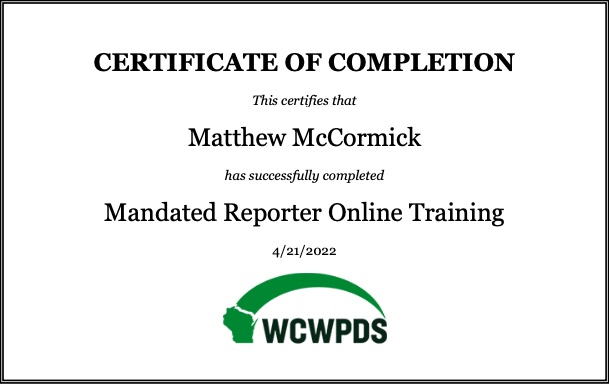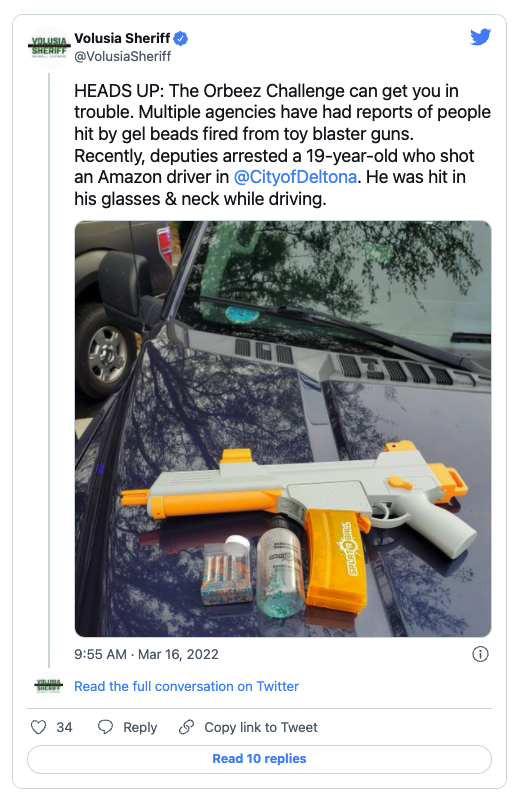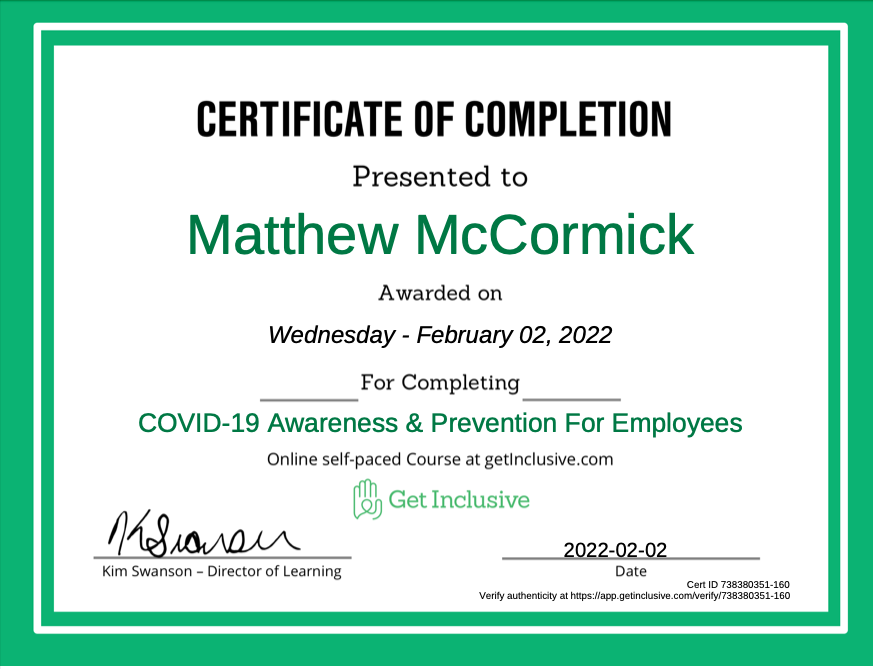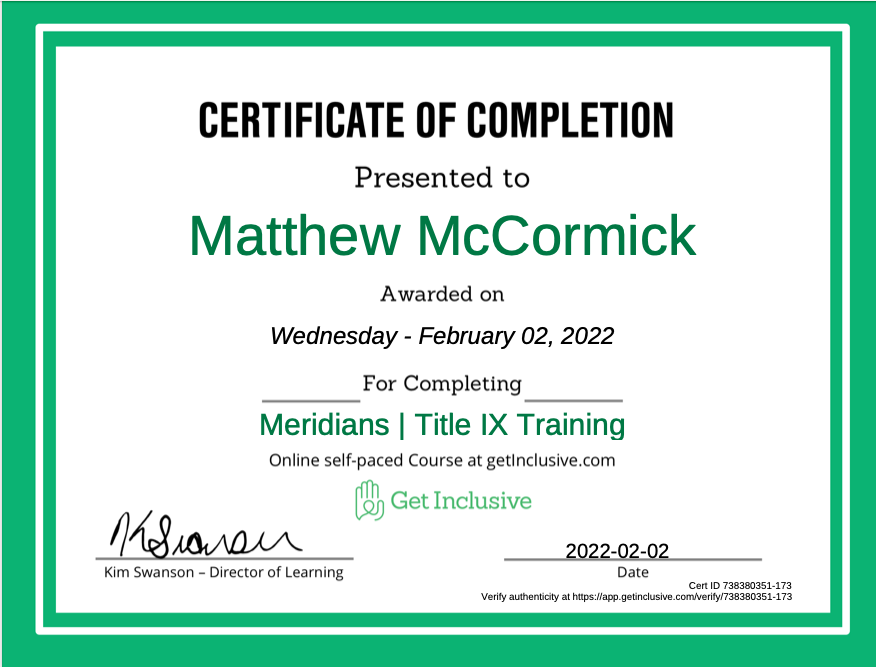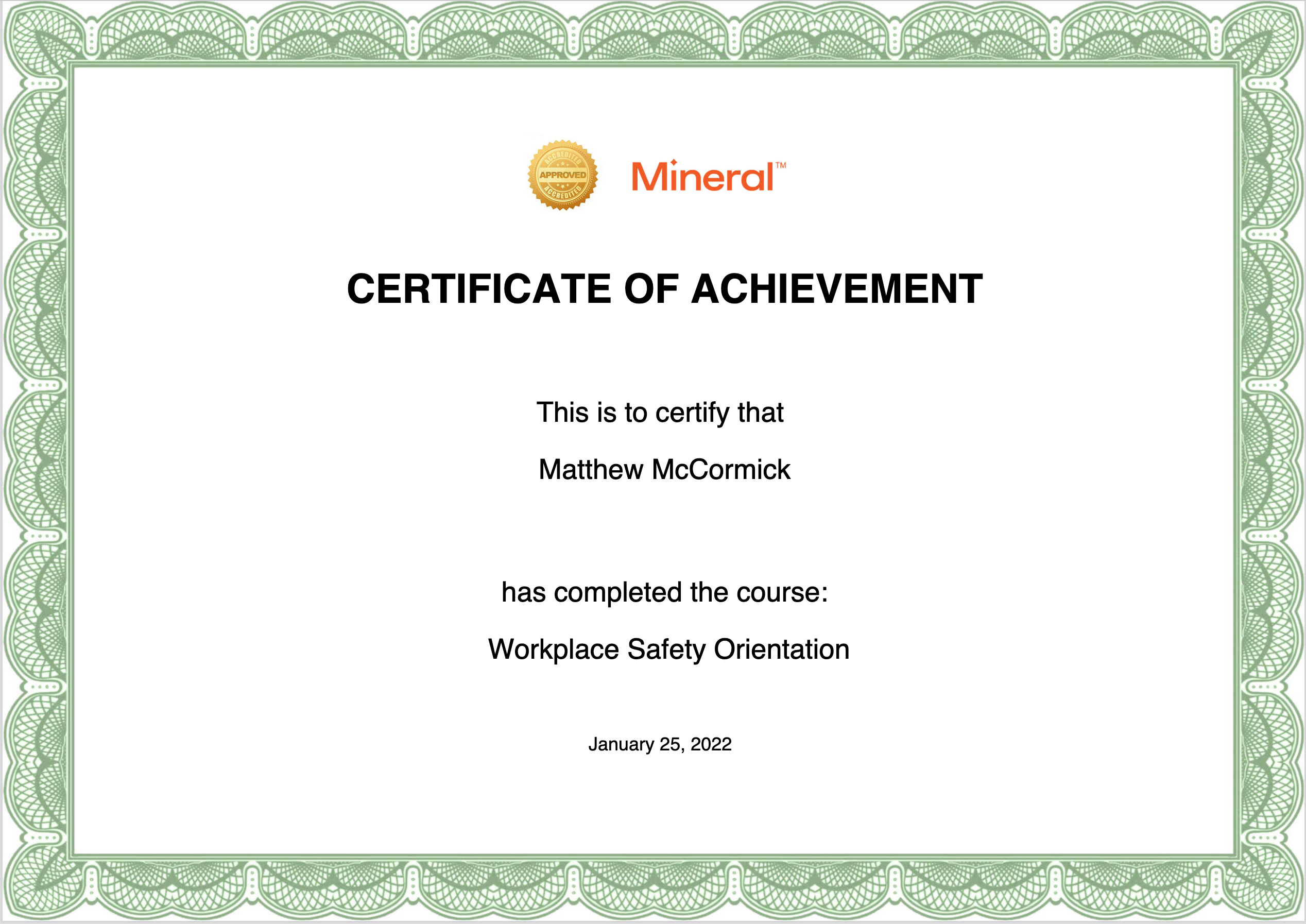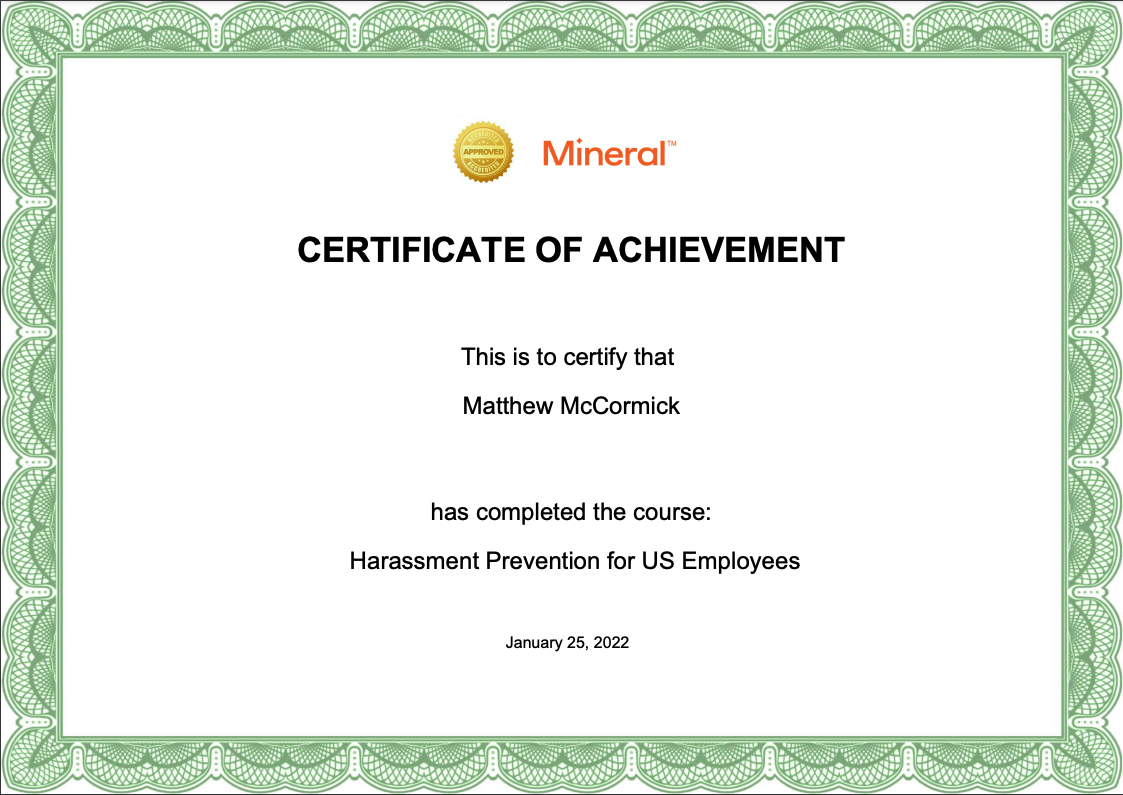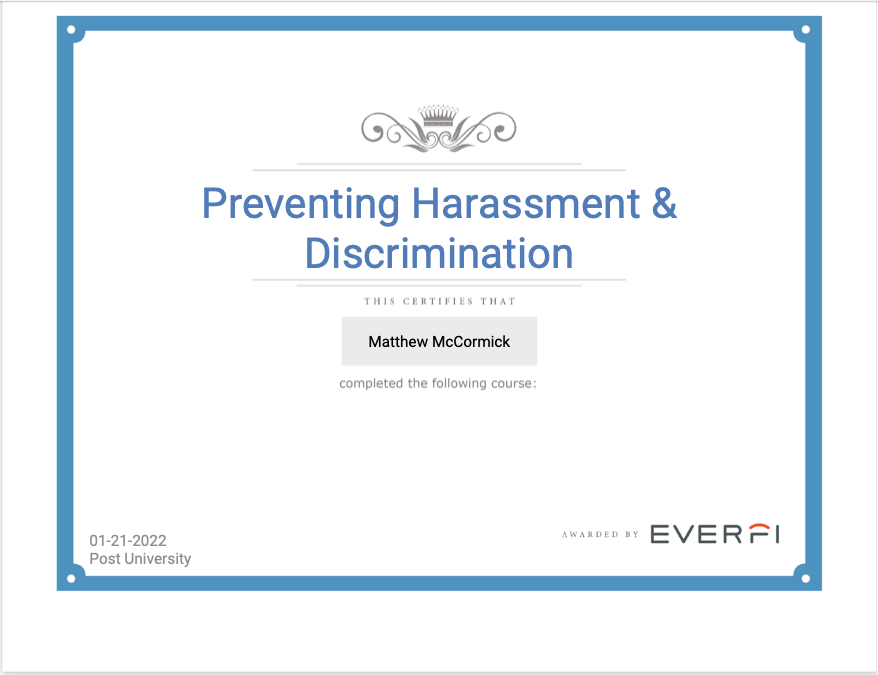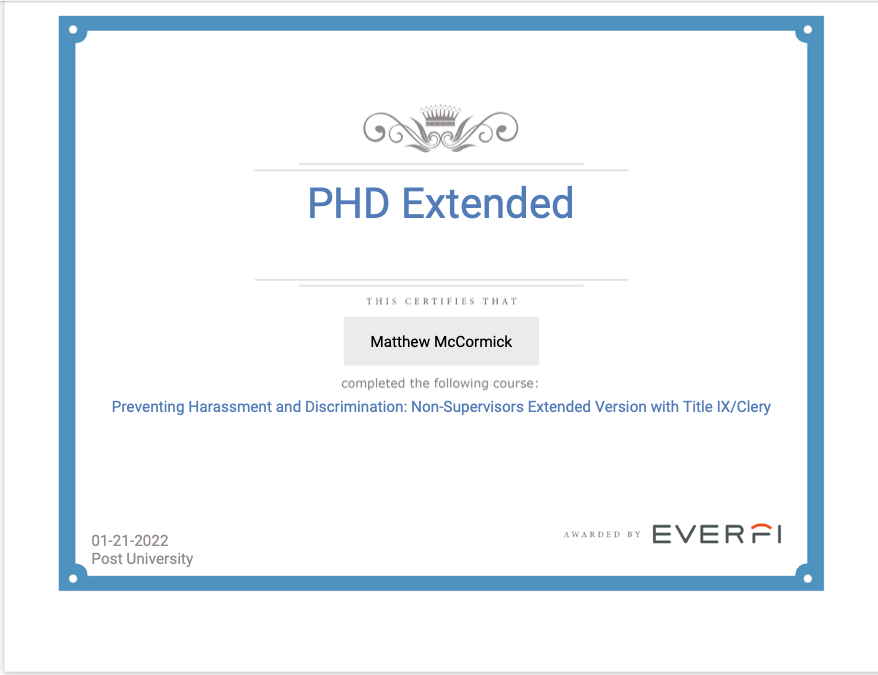WCWPDS University of Wisconsin-Madison Mandated Reporter Training
Police Issue Warnings About Dangerous New TikTok ‘Orbeez Challenge’
“A growing number of police and sheriff’s departments across the United States are sending out warnings about the so-called “Orbeez challenge,” claiming it’s a dangerous new trend spreading via TikTok.
They say that the challenge encourages others to attack unsuspecting individuals with an Orbeez gun, which fires a gel pellet.
“We continue to see teenagers … discharging splat ball guns (Orbeez) at other people … even at innocent bystanders. Now they are modifying the beads to be more painful,” Peachtree City Police in Georgia wrote in a recent Facebook post.
“As you can see from the attached photos from an incident [Monday] on the cart path, these can be very painful and can cause permanent injury,” the department also wrote, attaching a photo of a boy whose face was injured in an alleged attack.
Police in Volusia County, Florida, also told the New York Post that its officers “also warned of a string of Orbeez shootings in the area leading to four arrests so far.
“Recently, deputies arrested a 19-year-old man who shot an Amazon delivery driver in Deltona, hitting him in his glasses and his neck while he was driving his route. The same shooter also shot another random adult and a 10-year-old child in the face and chest,” the Volusia County Sheriff’s Office said in a Facebook post.
-please click on the image for greater detail
Spin Master, which makes Orbeez, told NPR in a statement that “children’s product safety is paramount at Spin Master, and we are committed to providing children and their families with the highest quality toys, games, and activities. Spin Master does not manufacture or sell gel guns.”
It added that “Orbeez are designed for educational, creative, and sensory play and are not intended to be used as projectiles or inserted in mechanisms.”
Police officials said that in some areas, alleged violators could face felony charges.
“These kids think it’s funny. They’re violating the law. They’re committing a battery. If the pellet happens to injure the person to the point it breaks the skin, could be looking at a felony charge. These things don’t go away. Could affect your future,” Winter Garden Police Captain Scott Allen told Orlando’s Fox35.
The Epoch Times has contacted Spin Master for comment.”
Court case: What can an adjunct say, and what can he choose not to say, without fear of reprisal from his employer?
“Federal judge green-lights much of a First Amendment case against the University of North Texas brought by an adjunct professor who said he lost a job for “joking” about micro-aggressions in a faculty lounge.
A former University of North Texas math instructor’s First Amendment case against the institution may proceed, in large part, according to a federal court in Texas.
The case involves “bedrock constitutional principles protecting freedom of thought and expression,” Judge Sean D. Jordan wrote in his 69-page opinion. And amid “a slew of constitutional claims” by the defendant, “a single question is paramount: What can a public employee say, and what can he choose not to say, without fear of reprisal from his employer?”
Some background: Nathaniel Hiers, then a recent Ph.D., started teaching multiple courses off the tenure track at UNT in 2019. In November of that year, according to his original complaint, someone anonymously left a stack of educational-style fliers about the harms of micro-aggressions in the math faculty lounge.
Hiers says that he disagrees with microaggression theory on the grounds that it “promotes a culture of victimhood” and “suppresses alternative viewpoints.” Yet it was in the spirit of lounge “banter” that he drew an arrow pointing to the fliers on the room’s chalkboard and wrote, “Please don’t leave garbage lying around.”
Just days prior, the university had asked Hiers via email to teach courses the following spring, and he agreed—though he hadn’t yet signed a formal offer letter. After the lounge “joke,” however, his department chair, Ralf Schmidt, criticized his chalkboard comment as “stupid,” “cowardly” and potentially threatening, and pressured Hiers to apologize. Hiers says he did not retract his comment, arguing that if it was all right to leave fliers, it should be acceptable to criticize them, as well. He also declined what he says was Schmidt’s suggestion (not order) that he take additional diversity training, beyond what the university already required.
Schmidt allegedly rescinded the spring teaching offer soon after this conversation. Hiers says he was blindsided, as he considered the earlier email correspondence about spring 2020 courses to constitute an agreement—even a contract.
When Hiers asked Schmidt what had happened, Schmidt via said via email, “Everyone makes mistakes, and I’m all for forgiveness if actions are followed by honest regret. But you very much defended your actions, and stated clearly that you are not interested in any kind of diversity training.” He added, “Your actions and response are not compatible with the values of this department. So with regret I see no other choice than to not renew your employment.”
Hiers sued North Texas and Schmidt, plus additional named administrators, in 2020. He alleged that the university and its various employees, in their personal and professional capacities, retaliated against him in violation of his First Amendment right to free speech. That is, Hiers says he was effectively fired for speaking on a matter of public concern—microaggressions, “in the context of teaching and scholarship”—in a way that never threatened the university’s ability to efficiently provide services.
Hiers accused the university of violating his civil rights in numerous other ways, as well, including via viewpoint discrimination and breach of contract. He alleged, too, that UNT’s misconduct policy is “overbroad” in that it restricts constitutionally protected speech by defining misconduct “non-exhaustively and with terms like ‘behavior that significantly impairs the function of teaching, research and creative activity, or service,’ ‘[a]ction(s) that impair or prevent other members of the university community from fulfilling their responsibilities or that create a clear and present danger to members of the university community,’ and ‘activity adversely affects the mission or reputation of the university.’”
UNT moved to dismiss the lawsuit, arguing that Hiers’s constitutional claims for damages were barred by sovereign immunity, that no constitutional violation occurred in the first place and that university officials were entitled to qualified immunity because they didn’t violate any clearly established right. Most of the university officials named in the lawsuit weren’t even involved in the dispute, the university said in court, and Hiers’s breach of contract claim was both barred by sovereign immunity and meritless.
In his written opinion about the case, Jordan disagreed with much of the university’s position, saying that Hiers had “plausibly alleged” First Amendment violations based on retaliation, viewpoint discrimination, unconstitutional conditions, compelled speech and “as-applied overbreadth” (but not facially unconstitutional overbreadth) of the misconduct policy. This is all regarding the defendants in their official capacities.
Regarding the defendants as individuals, Jordan dismissed, without prejudice, some of Hiers’s claims. But he didn’t let them off the hook for retaliation, saying, “Hiers has also met his burden of showing that the university officials are not entitled to qualified immunity on his retaliation claim because any reasonable university official would have known that it was unconstitutional to discontinue his employment because of his speech,” which touched on a matter of public concern. (Jordan also said that the university failed to assert “any interest in requiring Hiers to recant his views on microaggressions and apologize for his speech,” and so a common legal balancing test between an employee’s free speech and an employer’s interest in operational efficiency came out in favor of Hiers.)
Jordan further dismissed Hiers’s breach of contract claim, without prejudice, saying that the “problem for Hiers is that no such contract ever existed.” The emails about the spring 2020 classes, which don’t get into details about things like compensation, “contain insufficient terms to create an enforceable contract,” he added.
UNT didn’t offer immediate comment on the case. One of Hiers’s lawyers, Tom Brandon, said that the opinion bodes well for his client.
“Here is this nontenured professor, so they thought, you know, we can just can this person,” Brandon said of UNT. “Well, down the road, if you’re accused of First Amendment violations and retaliation, then, tenured or not, you’re still going to have to potentially be facing some adverse consequences.”
Brandon said the case wasn’t a referendum on micro-aggressions but rather about how institutions address thorny speech issues with their employees.
“I believe it could have been dealt with privately rather than a termination,” he said. “More emphasis on that would have probably yielded a different result.”
Eugene Volokh, Gary T. Schwartz Distinguished Professor of Law at the University of California, Los Angeles, and a frequent commentator on free speech issues, noted that Jordan dismissed Hiers’s Section 1983 claim for damages against university officials in their official capacities for lack of jurisdiction based on sovereign immunity. While this and other aspects of the opinion limit the potential scope of recovery for Hiers, Volokh said, Jordan’s decision still leaves room for “a substantive claim that can be had for retaliation,” in the form of an injunction against the defendants in their official capacities and damages against them their individual capacities.
Over all, Volokh said, the Hiers case thus far demonstrates how the First Amendment protects public college and university faculty speech about “important public matters. It’s not categorical protection. In principle, if it’s disruptive enough, at least in certain contexts, it might be restrictive. But it’s a pretty broad protection, and it protects the untenured and the lecturers as well as the tenured ones.”

